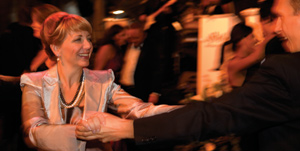|
||
      |
Business models
When Kateryna Yushchenko, MBA’86, the daughter of Ukrainian immigrants, was studying international finance and nonprofit management at the Graduate School of Business, “most people,” she recalled, “did not know about Ukraine.” Two decades later, she said at an October 7 dinner that kicked off the GSB’s annual Alumni Weekend, the country is much more well-known—especially since the Orange Revolution, when “the people of Ukraine stood up last fall and said they wanted a democracy.”

Kateryna Yushchenko dances after her GSB Alumni Weekend award presentation.
In the wake of that revolution, Yushchenko’s husband Viktor was elected Ukraine’s president. Her own role in the country’s transition from Soviet satellite to European state goes well beyond being the president’s wife. After graduating from the GSB, she had planned on a career in banking but had a chance to serve as special assistant to the assistant secretary of state for human rights and human affairs, focusing on human-rights issues and the Soviet Union. It was an offer that Yushchenko, who earned her undergraduate degree from the Georgetown University School of Foreign Service, couldn’t refuse. Positions at the White House Office of Public Liaison, the Treasury Department, and the Joint Economic Committees of Congress followed. In 1991 she moved to newly independent Ukraine, where as a KPMG consultant she helped teach the country’s financial managers about Western methods and the market economy. Today she leads Ukraine 3000, a foundation working to establish another Western import, the tradition of philanthropy.
As one of four Distinguished Alumni Award winners honored at the Millennium Park dinner, Yushchenko, who became a Ukrainian citizen earlier this year, accepted the Public Service Award with thanks and a disclaimer: “This award wasn’t given to me. It was given much more to the people of Ukraine.”
Occupying her spot on the dais with the practiced grace of someone used to the limelight and happily greeting the guests who lined up to meet her afterward, Yushchenko was the only one of the evening’s honorees to be trailed by plainclothes security and a camera-pointing media entourage. But she was hardly the only one who encouraged the event’s attendees to use their GSB skills and individual talents for something more than the bottom line.
Kathryn C. Gould, MBA’78, cofounder and general partner of the Silicon Valley venture firm Foundation Capital, received the Entrepreneurial Award. But rather than talk about her successful technology-based startups, Gould, who earned her degree in the GSB’s evening program while working on optical designs at Bell & Howell, focused on a nonbusiness startup of sorts: through a project called Magnum Opus, she commissions new orchestral works. “For those of you who have a knack for starting things,” said Gould, an amateur violinist, “I would encourage you at some point in your life to get well outside the purview of business and start something...to follow your passions.”
Jaime Chico Pardo, MBA’74, received the Corporate Alumni Award. As vice chair and CEO of Telmex, he guided the former state-owned monopoly through Mexico’s newly deregulated telecom market to its current status as a global, high-tech, multimedia company. Pardo was especially pleased, he said, to be one of two people honored for work done outside the United States: “This confirms once again the importance the University has had in forming people that have had an influence in world affairs.”
Winner of the Young Alumni Award was Thomas S. Ricketts, AB’88, MBA’93. Founder, chair, and CEO of Incapital Holdings, LCC—an investment bank that has changed the way corporations sell bonds to retail investors and that is now expanding into international markets—Ricketts noted that he had the advantage of attending the College before returning (while working at the Chicago Board Options Exchange) for his MBA. Calling his College education “enlightened yet brutal,” Ricketts summed it up this way: “I learned how to learn what I should know.”
In true Chicago-style, the dinner also included a chance to learn even more. Mixing black-tie and audiovisual aids after the awards ceremony, Richard Thaler, the Ralph and Dorothy Keller distinguished service professor of behavioral science and economics, shared his research on overconfidence versus market efficiency in the NFL draft. Lecture over, the dancing began.